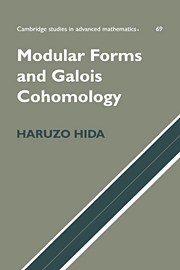1 - Overview of Modular Forms
Published online by Cambridge University Press: 18 December 2009
Summary
It is difficult to provide a brief summary of techniques used in modern number theory. Traditionally, mathematical research has been classified by the method mathematicians exploit to study their research areas, except possibly for number theory. For example, algebraists study mathematical questions related to abstract algebraic systems in a purely algebraic way (only allowing axioms defining their algebraic systems), differential geometers study manifolds via infinitesimal analysis, and algebraic geometers study geometry of algebraic varieties (and its siblings) via commutative algebras and category theory. There are no central techniques which distinguish number theory from other subjects, or rather, number theorists exploit any techniques available to hand to solve problems specific to number theory. In this sense, number theory is a discipline in mathematics which cannot be classified by methodology from the above traditional viewpoint but is just a web of rather specific problems (or conjectures) tightly and subtly knit to each other. We just study numbers, those simple ones, like integers, rational numbers, algebraic numbers, real and complex numbers and p-adic numbers, and that is it.
What has emerged from our rather long history is that we continue to study at least two aspects of these numbers: the numbers of the base field and the numbers of its extensions. For example, the quadratic reciprocity lawdescribes in a simple way how rational primes decompose as a product of prime ideals in a quadratic extension only using data from rational integers.
- Type
- Chapter
- Information
- Modular Forms and Galois Cohomology , pp. 1 - 22Publisher: Cambridge University PressPrint publication year: 2000



